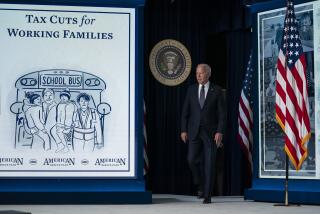Democrats to Propose Health Plan for Poor Children
WASHINGTON â Only months after enactment of the most significant medical insurance legislation in 30 years, Congress and President Clinton are poised to venture again into the volatile arena of health care reform.
This time the goal is to extend coverage to 10 million uninsured children in struggling families who do not qualify for Medicaid, the program that covers the poor.
But while the principle of covering children in low- and middle-class families enjoys broad and bipartisan support, the potential price tag--perhaps $5 billion to $10 billion a year--as well as the complexities of such a vast entitlement program make passage far from a sure thing.
âEverybody agrees on the principle,â said New York pediatrician Irwin Redlener, a longtime childrenâs advocate. âBut when it comes down to brass tacks, I donât know whatâs going to happen.â
Today, a group of liberal Senate Democrats plans to propose a government-subsidized program to help qualified working parents buy insurance for their children. Their proposal also will include a government-prescribed, standard benefits package--anathema to conservatives. Other childrenâs advocates plan to release a survey today conducted by a group of bipartisan pollsters showing strong public support for insuring children--even among die-hard balanced-budget champions.
âThereâs a genuine political opportunity and an absolutely human family need,â said Pete Willson, vice president of the National Assn. of Childrenâs Hospitals and Related Institutions Inc.
His optimism rests in part on the passage last summer of the bipartisan bill sponsored by Sens. Nancy Landon Kassebaum (R-Kan.) and Edward M. Kennedy (D-Mass.), which made it easier for millions of workers to retain coverage when they change jobs.
The clamor to cover all children is not new.
In the fall of 1994, as Clintonâs massive health care reform agenda was in its death throes, some Senate Democrats--including Tom Harkin of Iowa, Kennedy and Christopher J. Dodd of Connecticut--demanded steps to provide coverage for children.
But that proposal went nowhere, partly because it sought a controversial $1-per-pack cigarette tax as a way to finance the program.
Since then, analysts said, the number of uninsured children in the country has continued to rise, reaching todayâs level of 10 million to 12 million, with nearly 70% of them living in families with at least one employed adult.
Each $1 spent on childhood immunization saves as much as $10 in potential spending on treatment. On average, a childâs annual health care cost is 2 1/2 times less than that of an adult. At the same time, the cost of insuring a child is only about $1,000 a year--compared to about $2,500 for an adult, according to Uwe Reinhardt, a Princeton health economist.
The Senate Democratic proposal, to be unveiled today by Minority Leader Tom Daschle of South Dakota, would be paid for largely by curbing corporate tax breaks and using refundable tax credits to underwrite a sliding scale of subsidies based on family income. A spokeswoman for Daschle said it is too early to know how much the program would cost, noting that it has yet to be submitted to the Congressional Budget Office for analysis.
Democratic sources said the plan calls for a range of subsidies to families with annual incomes up to 300% of the poverty level--or about $39,000 for a family of three. Families with annual incomes as high as $24,000--or 185% of the poverty level--would receive the full amount of the insurance premium. Those earning above that level would receive lesser subsidies.
Independent health care experts said that such a program could cost $5 billion to $10 billion a year.
Congressional Republicans for the most part are hanging back, waiting especially for Clinton to complete a proposal he is considering to expand coverage for children. That developing plan is expected to be far more modest than Daschleâs, costing only about $750 million a year. Officials are still debating how to fund the proposal.
Even though the GOP is not taking the lead on the issue, Republicans are interested in broadening coverage for children, according to Redlener, who has spoken with congressional Republicans about the matter.
GOP lawmakers are developing alternative proposals that rely mostly on private-sector initiatives, sometimes in partnership with state governments.
More to Read
Get the L.A. Times Politics newsletter
Deeply reported insights into legislation, politics and policy from Sacramento, Washington and beyond. In your inbox three times per week.
You may occasionally receive promotional content from the Los Angeles Times.










